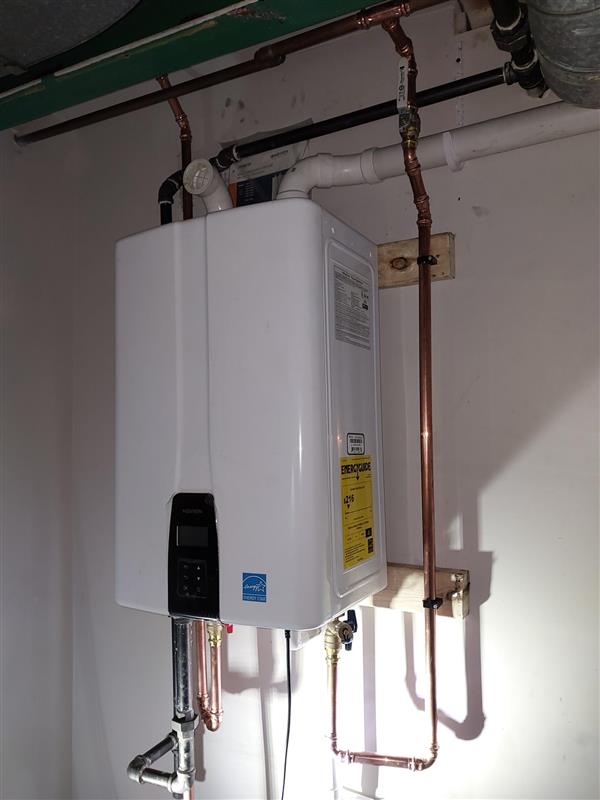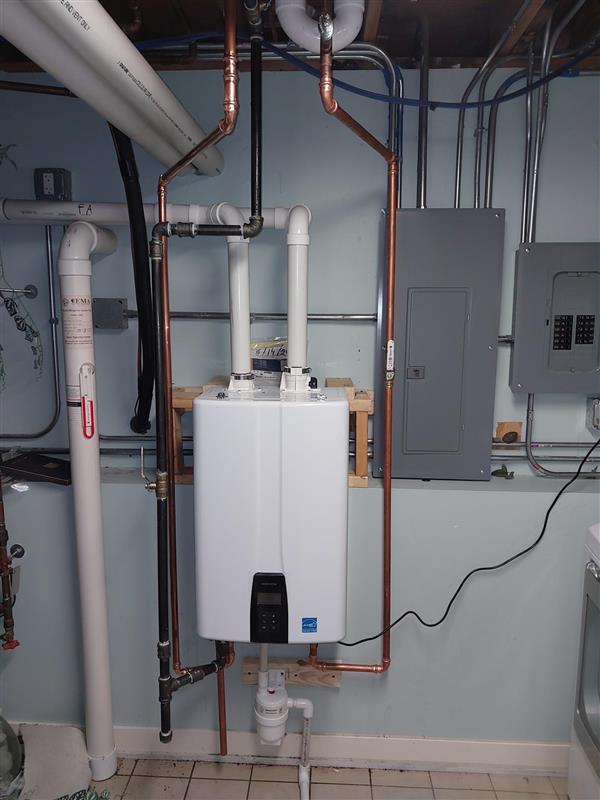CALL YOUR TRUSTED LOCAL EXPERTSSM
Tankless Water Heater Upgrades: Pros & Cons Decision Guide
By Dave Musial: CEO of Four Seasons Heating, Air Conditioning, Plumbing, Electric.
- October 8, 2025
When choosing a water heater for your home, you usually have two main options. These are the traditional storage tank water heater and the modern tankless water heater. Each offers distinct advantages and drawbacks that can impact your home's energy efficiency, convenience, and overall cost.
This guide will explain the main differences, benefits, and challenges of tankless and tank water heaters. It will help you decide which option is best for you.
Highlights At a Glance
- The main appeal of tankless water heaters is their ability to deliver an endless supply of hot water.
- Tankless water heaters also require very little space.
- Tankless units have a higher upfront cost.
- Tankless units tend to have longer lifespans.
- Electric tankless systems require a 200-amp electrical panel.
What Is a Tankless Water Heater?
A tankless water heater, also known as an on-demand water heater, heats water only when you need it. These systems do not store hot water in a tank.
Instead, they use strong heating elements or gas burners. These quickly heat water as it flows through the unit. This means you won’t have to wait for hot water to fill a tank. You also won’t run out of hot water during long showers or busy times.

How Do Traditional Tank Heaters Work?
Traditional water heaters keep a set amount of hot water in an insulated tank. This amount usually ranges from 30 to 80 gallons.
They heat the water ahead of time using electric elements or gas burners and keep it warm until you need it. When you turn on a hot water tap, the tank delivers preheated water. Once the stored hot water depletes, the tank must reheat a new batch, which can lead to waiting times during high demand.
Key Differences: Tankless vs. Tank
| Tankless Water Heater | Traditional Tank Water Heater | |
|---|---|---|
| Size | Compact, wall-mounted | Large, requires floor space |
| Hot Water Supply | Continuous, on-demand | Limited to tank capacity |
| Energy Efficiency | High, no standby heat loss | Lower, due to standby heat loss |
| Lifespan | Typically 20+ years | Usually 8–12 years |
| Initial Cost | Higher unit and installation cost | Lower upfront cost |
| Maintenance | Less frequent but sometimes costly | Regular flushing and maintenance needed |
| Installation | May require upgrades to home systems | Easier to replace existing units |
Pros of Tankless Water Heaters
- Energy Efficient: According to the Department of Energy, tankless water heaters can be 24-34% more efficient for low use homes and 8%-14% more efficient for homes that use a lot of hot water.
- Space Saving: Their compact design makes them perfect for homes with limited space. You can fit the average system inside a small closet and still have room for storage.
- Continuous Hot Water: You won’t run out of hot water even if 10 people take showers in a row. (But if you have numerous hot water demands happening simultaneously, this may reduce the level of warmth temporarily.)
- Longer Lifespan: With proper maintenance, tankless systems often last longer than traditional tanks.
- Reduced Risk of Leaks: Without a storage tank, the risk of leaks and water damage decreases significantly.
Cons of Tankless Water Heaters
- Higher Initial Cost: Both the unit price and installation can be more expensive.
- Retrofitting Challenges: Older homes may require electrical upgrades to support the higher power demand. A 200-amp panel is a minimum requirement.
- Limited Flow Rate for Large Households: During simultaneous usage (multiple showers, appliances), performance may be impacted.
- Cold Water Sandwich Effect: A brief burst of cold water can occur in between hot water when your first turn on the water. If cold bursts are happening randomly, this can be a sign of mineral buildup in the lines.
- Maintenance Needs: Though less frequent, descaling is needed in areas with hard water.
Hard Water Tolerance
Tankless & Hard Water
Hard water, rich in calcium and magnesium minerals, poses significant challenges for both tankless and traditional tank water heaters—but the impact and maintenance needs differ between the two.
Tankless systems are especially vulnerable to scale buildup caused by hard water minerals. These minerals deposit inside the heat exchanger, reducing efficiency by insulating heating elements and restricting water flow. Over time, this buildup can lead to overheating, component damage, reduced lifespan, and higher energy bills as the system works harder to heat water. Because tankless units rely on rapid, efficient heat transfer, even minor scale buildup can have significant effects.
To protect a tankless heater in a hard water area, installing a water softener or scale-inhibiting filter is necessary. Regular descaling maintenance every 6 to 12 months is also crucial to remove mineral deposits and sustain performance.

Traditional Tank & Hard Water
Hard water causes sediment buildup at the bottom of a tank system. This can reduce heating efficiency, increase wear on tank components, and shorten the system’s lifespan due to corrosion.
Tanks require frequent flushing to remove sediment, and the buildup may lead to leaks or tank failure over time. The larger water volume somewhat lessens the impact of minerals, but maintenance remains essential to protect the unit.
Temperature Adjustment: An Overlooked Bonus
One often overlooked advantage of tankless water heaters is the precise temperature control they offer. Unlike traditional tank water heaters, which typically have less exact dial controls and a single set temperature for the entire tank, most tankless models feature digital LED panels that let you adjust the water temperature degree by degree.
| Tankless | Tank (Traditional) | |
|---|---|---|
| Temperature Adjustment Speed | Instant | Slow (hours) |
| Temperature Precision | High (digital) | Low (mechanical dial) |
| Temperature Stability (steady flow) | Very good | Good |
| Temperature Stability (variable flow) | Moderate (can fluctuate) | Good until tank cools |
Decision Checklist
- Choose a tankless water heater if you want energy savings, have limited space, need endless hot water, and are willing to invest more upfront.
- Opt for a storage tank water heater if upfront cost is a priority, you have moderate water use, or your home isn’t equipped for the demands of tankless units.
Summary
Choosing between a tankless or storage tank water heater depends on your household's size, budget, space, and priorities. Tankless heaters provide long-term energy savings and endless hot water. They also take up less space. However, they have higher initial costs and may be harder to install.
Traditional tank water heaters are cheap and well-known. However, they are less efficient and can run out of hot water during heavy use. By understanding these pros and cons, you can select the water heating system that best fits your lifestyle and home.


